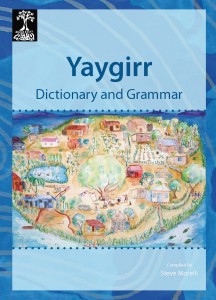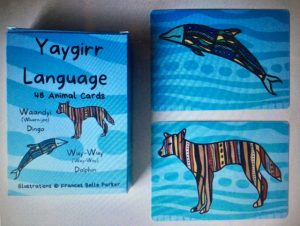Yaygirr language today
The homeland of the Yaegl people is the Clarence Valley in the Northern Rivers region of New South Wales including the towns of Maclean, Yamba and Iluka. Today, Yaegl people tend to use the spelling Yaegl when referring to people and organisation names, and Yaygirr when referring to the language.
From around 2004 Yaegl Elders worked closely with Muurrbay teacher-linguist, Brother Steve Morelli, holding language workshops with the Ulugandahi Elders group, as well as language classes in Maclean. This led to Muurrbay publishing The Yaygirr Dictionary and Grammar in 2012, order it here. Several Yaygirr language courses have since been held at Maclean TAFE taught by David Prosser and Brother Steve.
In future, Muurrbay would like to support the community to pass on the language to other adults and children, by such activities as developing an in-depth Yaygirr language course and more teaching and learning materials for adults.

Ginagay? Ibirr ngina nyaagigu.
A YAYGIRR greeting
How are you? Pleased to meet you.
Yaygirr Language Flash Cards are a great resource for learning different animal names.
Artwork and design by Yaegl artist Frances Belle Parker. Language advice by Yaegl woman Kerri McLeay. Developed in collaboration with Mudyala Aboriginal Corporation. To order please go to https://www.dyindadesigns.com.au/product/yaygirr-language-flash-cards

Yaegl people and early researchers
The ancestors of present day Yaegl people lived around the mouth of the Clarence River and spoke Yaygirr. From 1929, Jack Cameron worked with the linguist Gerhardt Laves and shared with him valuable Yaygirr words. Laves may have also made contact with the Yaygirr speaker Jack Freeburn. Most of the Yaygirr audio recordings were given by Jack’s son, Sandy Cameron to William Hoddinott and Terry Crowley. Unfortunately, by then the language was no longer spoken right through.
Language features
Some features of Yayygirr include:
- Three vowels: a, i, and u which can also be pronounced as a longer vowel, and 14 consonants: b, d, dy, g, l, m, n, ng, ny, r, rr, rh, w and y.
- Three kinds of ‘r’ sounds, one of which is probably not found anywhere else in Australia. Written with ‘rh’ it is an unvoiced trill: said like a Scottish ‘r’ but without using the voice box. People hearing the word dirha: ‘tooth’ for the first time might think they hear ‘deerssa’.
- A rich system of noun tag endings to indicate who is doing what, with what, possessor, location, movement towards, movement from etc.
- Singular, dual and plural pronouns which appear in many different forms depending on what meaning they are showing, e.g. ‘to me’, ‘for me’ or ‘from me’.
- Three verb tenses: present, past and future and other endings to convey different meanings, such as continuous action, might, or want to.
- Sentences have free word order, although there is a tendency towards the order of: subject – object – verb.
Yaygirr and Gumbaynggirr
Yaygirr and Gumbaynggirr are separate languages. A person speaking only Yaygirr could not have understood Gumbaynggirr. However, a 1997 map showed that 46% of Yaygirr and Gumbaynggirr words are closely related. Some are exactly the same: eg, ngaluunggirr means ‘clever-man’ in both languages. Many other words are only slightly different: ‘drink’ is ngabii in Yaygirr and ngambii in Gumbaynggirr.
Many Yaygirr words start with a vowel ‘a’, ‘i’ or ‘u’. The word for sea is aagal in Yaygirr compared with gaagal in Gumbaynggirr. It seems that the initial consonant of some Gumbaynggirr words has been dropped to form the Yaygirr word (no Gumbaynggirr words begin with a vowel). So Yaygirr ina ‘foot’ is jiina (Gumbaynggirr); Yaygirr ila ‘cook’ is yiila (Gumbaynggirr) and Yaygirr uraagay ‘possum’ is gurraagay (Gumbaynggirr).
Three dialects
There is some evidence for three dialects of this language:
- Yaygirr, originally spoken near the mouth of the Clarence River
- Yirraygirr spoken by the people who lived upriver of Maclean and
- Yunggaya spoken by those who lived around Ulmarra.
Speaking Yaygirr everyday
Hello there!
Yuu!
How are you?
Ginagay?
Pleased to meet you.
Ibirr ngina nyaagigu.
Are you feeling well?
Ngindadi darhuyay mabu?
I’m feeling good.
Darhuyay ngaya mabu.
I’m not feeling good.
Yawiirray ngaya mabu.
I’m sick.
Ngaya wigun.
Do well!
Darhuya ngiinda!
Thank you / Congratulations.
Darhuyay irriirring.
Goodbye / I’m going.
Ngaya dyaarri yaarrang. OR Dyaarri yaarrang.
Please.
Irriiri-nda.
Please don’t.
Wanaa-nda.
Yes.
Ngii.
No.
Wadyi.
What’s your name?
Warha nguunu waambarr?
My name is XXXX.
Ngaanyu waambarr XXXX.
I’ll see you!
Ngadya ngina nyaawi!
Yaygirr Welcome
Adyi ngaya Yaygirr.
I am Yaygirr.
Adyi ngaya nginagandyi Birriin-da / Gulaany-dya.
I live here at Maclean / Yamba.
Darhuyay yarraanay Birriinda / Gulaany-dya.
Welcome to Maclean / Yamba.
Adyi Yaygirr wadyarr.
This is Yaegl country.
Adyi ngadya arraygi Yayarr yangidawu.
I remember our ancestors from long ago.
Adyi ngadya arraygi ngulungginy, ngamiiga.
I remember my Elder men and Elder women.
Wadyiiway.
This ends here.